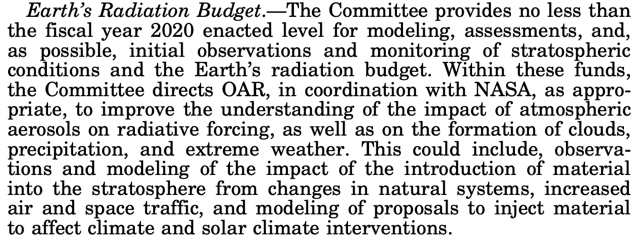A new presidential administration in the United States means critical changes can happen across important areas in policy. This is especially true of climate, and the number of new ideas is growing by the minute. But in the excitement of finally having the most progressive presidential platform yet seen for climate change in hopes of limiting temperature rise and achieving net-zero emissions, there remains an important question in this arena: will this administration grapple with solar geoengineering?
To be clear, regardless of whether the Biden Administration wants to be dealing with solar geoengineering, money in support of federally funded research has already started to flow. In fiscal year 2020 (FY20), congressional appropriations allocated the first-ever funds to NOAA for solar geoengineering research at a level of $4 million. While not a lot in the context of government-funded science research, the funds are important nonetheless, and are being spent now. While the money been used entirely for modeling research that is currently underway, the legislative language alluded to outdoor experimentation – a step that would require a robust governance infrastructure. (See a blog I wrote about these appropriations earlier this year here.)
In July 2020, the FY21 House appropriation bill echoed the (somewhat vague) language of FY20, and added $5 million in additional funds:

And on November 10, the FY21 Senate appropriations bills came out with the same financial support of FY20, alongside some updated language. This new language helpfully clarifies the focus of the funds on important modeling work as well as the inclusion of NASA – a key partner in earth observations:

Importantly, this means that the FY20 funding was not a one-off. While it has not yet been signed into law, funding will likely continue, with bicameral and bipartisan support. So what might this mean as we enter a new administration?
Let me first state that mitigation, adaptation, and carbon removal policies must be priorities. The United States now has renewed federal attention toward reducing emissions and building resilience, and we must take advantage of this moment. Solar geoengineering should only exist in the context of these other approaches as we attempt to determine how it might function (if at all) to limit harm as we strive to reach our climate goals.
But with a new opportunity to start thinking about climate change and action finally on the horizon, perhaps the time has come for the federal government to take a small step forward and begin talking about national governance for research. Governance is key for research to create standards around oversight, transparency, and public engagement. For something as impactful as solar geoengineering, national and international coordination around research is critical.
An important first step is to build a level of federal government acknowledgment and understanding that we have thus far lacked. Here are a few thoughts on what that might look like in the near term:
These are only a handful of ideas on how we can start building important capacity to be able govern the early stages of federally funded solar geoengineering research – research that has already begun. Building this capacity on the national level is critical to ensuring that transparency, public participation, and scientific merit are centered on how this federal research is pursued.